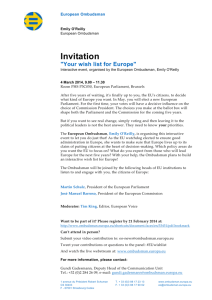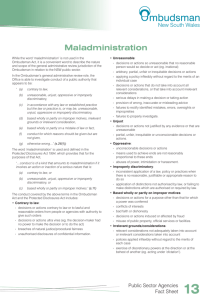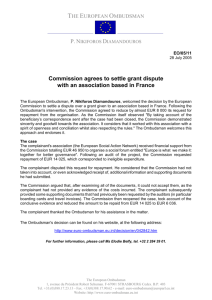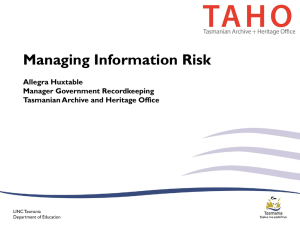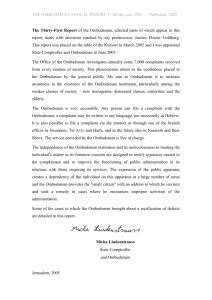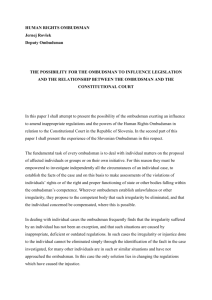Principles
advertisement
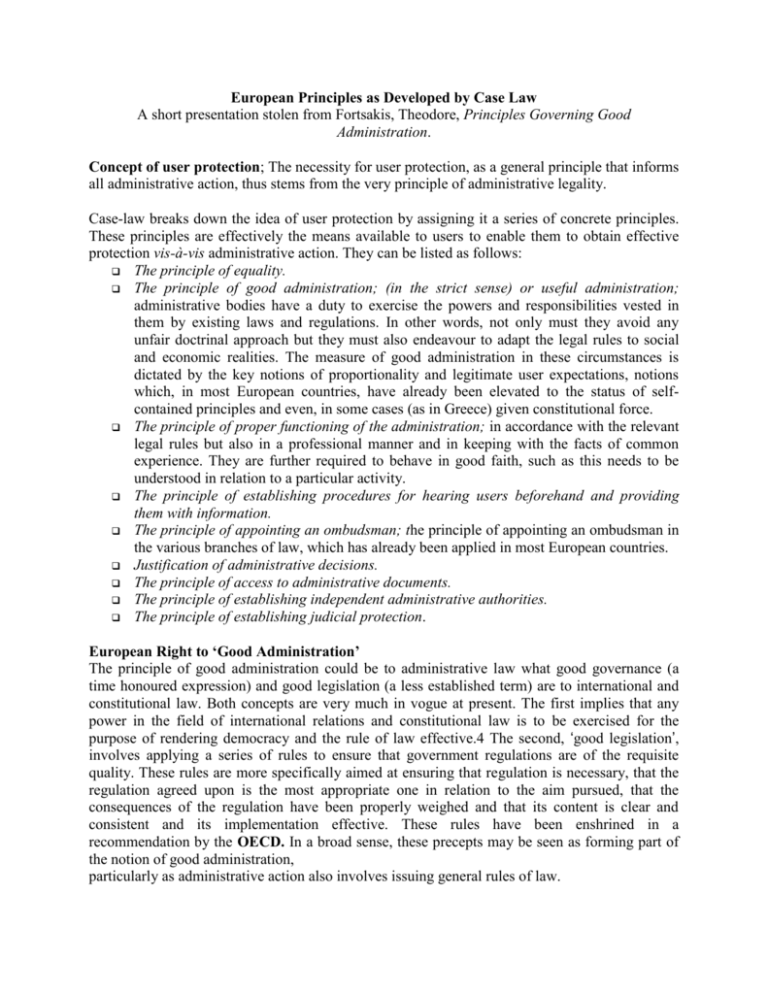
European Principles as Developed by Case Law A short presentation stolen from Fortsakis, Theodore, Principles Governing Good Administration. Concept of user protection; The necessity for user protection, as a general principle that informs all administrative action, thus stems from the very principle of administrative legality. Case-law breaks down the idea of user protection by assigning it a series of concrete principles. These principles are effectively the means available to users to enable them to obtain effective protection vis-à-vis administrative action. They can be listed as follows: The principle of equality. The principle of good administration; (in the strict sense) or useful administration; administrative bodies have a duty to exercise the powers and responsibilities vested in them by existing laws and regulations. In other words, not only must they avoid any unfair doctrinal approach but they must also endeavour to adapt the legal rules to social and economic realities. The measure of good administration in these circumstances is dictated by the key notions of proportionality and legitimate user expectations, notions which, in most European countries, have already been elevated to the status of selfcontained principles and even, in some cases (as in Greece) given constitutional force. The principle of proper functioning of the administration; in accordance with the relevant legal rules but also in a professional manner and in keeping with the facts of common experience. They are further required to behave in good faith, such as this needs to be understood in relation to a particular activity. The principle of establishing procedures for hearing users beforehand and providing them with information. The principle of appointing an ombudsman; the principle of appointing an ombudsman in the various branches of law, which has already been applied in most European countries. Justification of administrative decisions. The principle of access to administrative documents. The principle of establishing independent administrative authorities. The principle of establishing judicial protection. European Right to ‘Good Administration’ The principle of good administration could be to administrative law what good governance (a time honoured expression) and good legislation (a less established term) are to international and constitutional law. Both concepts are very much in vogue at present. The first implies that any power in the field of international relations and constitutional law is to be exercised for the purpose of rendering democracy and the rule of law effective.4 The second, ʻgood legislationʼ, involves applying a series of rules to ensure that government regulations are of the requisite quality. These rules are more specifically aimed at ensuring that regulation is necessary, that the regulation agreed upon is the most appropriate one in relation to the aim pursued, that the consequences of the regulation have been properly weighed and that its content is clear and consistent and its implementation effective. These rules have been enshrined in a recommendation by the OECD. In a broad sense, these precepts may be seen as forming part of the notion of good administration, particularly as administrative action also involves issuing general rules of law. a. The European Commission The Commissionʼs Rules of Procedure [C(2000) 3614] are particularly useful in obtaining a sound grasp of precisely what is meant by the right to good administration. For attached to this text is the Code of good administrative behaviour for staff of the European Commission in their relations with the public. At the beginning of this document, it is stated that the Commission and its staff have a duty to serve the Community interest and, in so doing, the public interest. The Code goes on to say that the public has a right to expect quality service and an administration that is open, accessible and properly run. Quality service, it is explained, requires the Commission and its staff to be courteous, objective and impartial. Under the heading Purpose, it is stated that to enable the Commission to meet its obligations of good administrative behaviour, in particular in its dealings with the public, the Important European Documents Draft European Constitution European Ombudsman: The draft European Constitution provides a constitutional framework (Art. 1-48) for the appointment of a European Ombudsman. The draft Constitution contains other provisions as well which, although they do not expressly refer to good administration, either derive from or rely upon it. Notable examples include the provisions on transparency of the proceedings of Union institutions (Art. 49), which refer specifically to the idea of good governance, the provisions on participatory democracy (Art. 46), the provisions on protection of personal data (Art. 50), on citizenship of the Union, the European Ombudsman (Art. 48), etc. (Kolla art. så att de inte bytt numrering!) The Charter of Fundamental Rights of the European Union Chapter V of which, on citizenship, expressly guarantees the right to good administration (Art. 41): 1. Every person has the right to have his or her affairs handled impartially, fairly and within a reasonable time by the institutions and bodies of the Union. 2. This right notably includes: – the right of every person to be heard, before any individual measure which would affect him or her adversely is taken; – the right of every person to have access to his or her file, while respecting the legitimate interests of confidentiality and of professional and business secrecy; – the obligation of the administration to give reasons for its decisions. 3. Every person has the right to have the Community make good any damage caused by its institutions or by its servants in the performance of their duties, in accordance with the general principles common to the laws of the Member States. 4. Every person may write to the institutions of the Union in one of the languages of the Treaties and must have an answer in the same language. Examples of Principles in the Charter: The right of access to documents (Art. 42) Concerning the Ombudsman of the Union, to whom any EU citizen may refer cases of maladministration in the activities of Community institutions or bodies, with the exception of the Court of Justice and the Court of First Instance acting in their judicial role (Art. 43). The right to petition the European Parliament (Art. 44). The right to the protection of personal data (Art. 8). The right to equality before the law (Art. 20). The right to non-discrimination (Art. 21). The right to cultural, religious and linguistic diversity in the European Union (Art. 22) The principle of equality between men and women (Art. 23). The provisions pertaining to justice: (e.g.) The right to an effective remedy and to a fair trial (Art. 47)… Regulations: Regulation (EC) No 1049/2001 of the European Parliament and of the Council of 30 May 2001 regarding public access to European Parliament, Council and Commission documents Recommendations: Recommendation of the Council of the OECD on improving the quality of governement regulation (adopted on 9 March 1995). The Commissions Rules of Procedure [C(2000) 3614] (Good administration; the public has a right to expect quality service and an administration that is open, accessible and properly run. Quality service, it is explained, requires the Commission and its staff to be courteous, objective and impartial…. ) The Code centres around six points. It begins by establishing the general principles of good administration: lawfulness, non-discrimination and equal treatment, proportionality and consistency. Secondly, it lays down guidelines for good administration, namely objectivity and impartiality, and information on administrative procedures. Thirdly, under the heading Information on the rights of interested parties, it establishes the principle of listening to all parties with a direct interest, the duty to justify decisions and the duty to state arrangements for appeal. Fourthly, it establishes the rules for dealing with inquiries, including notably: requests for documents, stipulating that if the document has already been published, the person making the inquiry must be directed to the official sales agents or to centres which provide free access to documents, including in electronic form; correspondence, with the duty (Art. 21 of the Treaty) to reply in the language of the initial letter provided that it was written in one of the official languages, within 15 working days, indicating the person responsible – where a reply cannot be sent within 15 working days, a holding reply is to be sent; telephone communication, with staff being required to identify themselves when answering the telephone and to return calls as promptly as possible; electronic mail, with the duty to reply promptly unless the e-mail message is the equivalent of a letter, in which case it is to be handled according to the guidelines for handling ordinary correspondence; the protection of personal data and confidential information, with a duty to respect the rules on the protection of privacy and personal data, to respect professional secrecy (Art. 287 of the Treaty), to respect the rules on secrecy in criminal investigations and the confidentiality of matters falling within the ambit of the various committees and bodies of the Administration (Art. 9 of and Annexes II and III to the Staff Regulations). Sixthly, under the heading Complaints, it is stated that in the case of a breach of the principles set out in the Code, complaints may be lodged directly with the Commission, which will forward them to the relevant department, who is bound to reply to the complainant within two months. The complainant then has one month in which to apply to the Secretary-General of the European Commission to review the outcome of the complaint, who is in turn required to reply within one month. It is further stated that a complaint may also be lodged with the European Ombudsman (Art. 195 of the Treaty). Usefulness: Even though the principles laid down in the Code do not really contribute anything new to what has already been said on the subject of user protection, and even though the Code in theory applies only to Commission staff, this instrument, by its nature, clearly has a symbolic significance that goes far beyond its formal scope, and provides a template that could be used by any administration. EUROPEAN CASE LAW The Court of Justice and the Court of First Instance Court of First Instance on 17 September 2003 (case T-76/02), found that the failure to provide access to administrative documents constituted a breach of good administrative practice. The judgment was careful to state precisely which rule had been infringed, namely Regulation (EC) No 1049/2001 of the European Parliament and of the Council of 30 May 2001 regarding public access to European Parliament, Council and Commission documents, which was adopted to clarify Art. 255 of the Treaty in which such access is grounded. Court judgment of 18 September 2003 (case C-338/00 P), for example, while it is acknowledged that by disclosing to the press, with a high degree of accuracy, an essential element of the contested decision before it was adopted, namely the amount of the fine envisaged, the Commission adversely affected the dignity of the undertaking charged and acted contrary to the interests of proper Community administration, this irregularity was not enough to set aside the decision in question, as it had not been established that the content of the decision would have differed if that irregularity had not occurred. Court of First Instance of 30 September 2003 (case T-346/02 and T-347/02) - mention is made of an infringement of the principle of good administration without any further elaboration. Court of First Instance of 21 October 2003 (case T-392/02) accordingly dismissed the application on finding that there had been no infringement of ʻthe principles of equal treatment, legal certainty, sound administration and good faith. (the principle of good administration is referred to as one of a series of other similar principles, without actually singling it out.) Court judgment of 16 October 2003 (case C-339/00), where the application was dismissed because there had been no infringement of the principle of the protection of legitimate expectations, without expressly referring to the principle of good administration from which it derives. (The reference to the principle of good administration is left implicit.) The draft European Constitution provides a constitutional framework (Art. 1-48) for the appointment of a European Ombudsman, in the following terms: A European Ombudsman appointed by the European Parliament shall receive, investigate and report on complaints about maladministration within the Union institutions, bodies or agencies. The European Ombudsman shall be completely independent in the performance of his or her duties. The Decisions of the Ombudsman: Decision 43/2000/PB, refers to the idea of a breach of the normal practice of the Commission and to the notion of maladministration. Decision 1206/2000/BB refers to an instance of maladministration. Decision 232/2001/GG refers to the Code of Good Administration and concludes that the principles of good administration would have required the Commission to carry out a comprehensive examination in cases where it was alleged that there had been maladministration in a tender procedure. Decision 1702/2001/GG, states that good administrative practice or the principle of good administration demands that applications be examined in the light of the requirements to which they are subjected by the rules in force; likewise, applicants must be kept informed about the decisions the administration adopts in their regard, all the more so if such information is requested by applicants; dealing with applications within a reasonable time is also part of these same principles, as is the right to be heard before an adverse decision is taken. Decision 1767/2001/GG concludes that it is good administrative practice to reply to citizens letters within a reasonable time, and that failure to do so constitutes an instance of maladministration. Decision 331/2002/(SM)GG, also states the principle of good administrative behaviour likewise requires that decisions be taken within a reasonable time. Decision 914/2002/ADB holds that the same principle (as above) requires letters to be answered and decisions taken within a reasonable time. Decision 1237/2002(PB)OV, states that respect for legitimate and reasonable expectations is part of good administrative practice. Decision 1579/2002/IJH states that it is good administration to respect the reasonable expectations created by the behaviour of an institution or body. Decision 1837/2002/BB looks to the code when citing the right to receive a prompt reply to a letter. Conclusion (as well as guidelines for our future work) Having reviewed the history of the new European right to good administration and sought to understand it in its present, still rather fuzzy form, the time has now come to ponder its future. Before making any predictions, however, it needs to be established whether this notion now acts as a kind of umbrella for the numerous disparate rules previously grouped around the notion of user protection – in which case the change would be a quantitative one – or whether it is of an entirely new nature – in which case there has been a qualitative shift. It is still too early to give a definite answer. There is good reason to think, however, that in future, any oversight brought to bear on the activities of the administration will focus not just on specific administrative acts, but also on the administrative procedures themselves. In other words, there has been a shift in emphasis from the outcome of administrative action (result) to administrative behaviour (functioning). Other clues, the discussion of which is beyond the compass of the present report, suggest that this is indeed the direction in which the concept of good administration is moving. Good administration, good governance, good legislation all effectively presuppose the existence of a large pool of good people. Is a good administration one that makes good decisions (i.e. legal decisions) or will we eventually come round to the view that good acts are ones that are produced by a good administration, without the need for any other reference to some predefined legality? In other words, are good acts to be defined objectively in their own right or should they, as Aristotle suggests, more properly be regarded as the acts of a good person?1 1 Fortsakis, Theodore, Principles Governing Good Administration.

